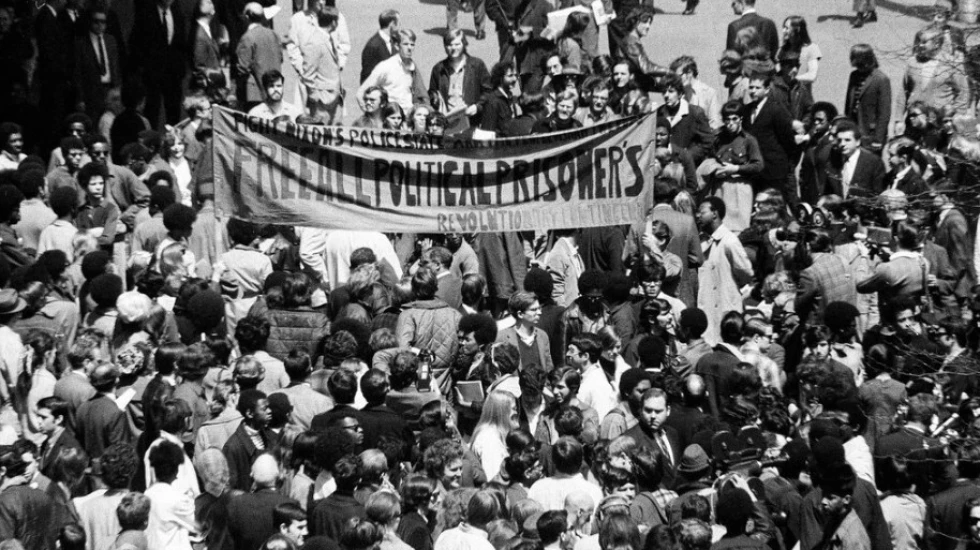
As published in the Chicago Daily News and the Chicago Sun-Times:
On May 1, 1969, chants of “Free Huey” filled downtown Chicago. In Federal Plaza, members of the Illinois Black Panther Party gathered to protest the imprisonment of Panther co-founder Huey Newton, who’d been convicted of voluntary manslaughter in the death of an Oakland, California, police officer.
Both the Chicago Daily News and its sister publication, the Chicago Sun-Times, covered the press conference the previous day announcing the rally and the protest, but the work produced shows neither paper had much sympathy for Newton or the Black Panthers.
On April 30, Sun-Times reporter Christopher Chandler attended what he called a “bizarre press conference” announcing the rally at Black Panther headquarters on West Madison Street.
“The staircase to the second-floor headquarters was barricaded against possible attack, the walls covered with posters of revolutionary heroes, quotes from [Mao Zedong] and precise instructions for a disciplined membership,” Chandler wrote.
Deputy minister of labor Yvonne King led the conference with two women and read a brief statement about the rally. “All concerned with the liberty of the people will be there,” she said. “We are trying to show the power structure that the people demand Huey P. Newton be freed. We are going to exhaust all legal means. The oppressed people of the world believe he must be freed.”
Newton co-founded the Black Panther Party for Self Defense in Oakland along with Bobby Seale (who would later be tried in the fall in Chicago on charges related to the 1968 Democratic National Convention unrest) in 1966, according to Black Past. The party stood against police brutality and worked to expose the institutional inequalities the Black community faced while empowering it through free-breakfast programs and health clinics. Many saw his 1967 conviction as a plot to silence Newton and weaken the party.
The Daily News only mentioned the rally in passing and buried it deep in a story about a shootout between San Francisco police officers and the Panthers. “Police said the trouble started when a squad car passed Black Panther headquarters and found a man exhorting a crowd over a loudspeaker to attend a rally here Thursday to ‘free Huey Newton,’” the paper reported.
Despite sending a photographer to the press conference and rally, the Sun-Times did not run any photos of the rally in Federal Plaza, though it did provide some good shots of the crowd and speakers. The write-up offered few details of what happened.
“Between 300 and 350 persons gathered outside the Federal Building for about two hours Thursday to cheer speakers at a ‘Free Huey Newton’ rally,” the paper printed. “Newton, imprisoned Black Panther Party minister of defense, was lauded by Ald. A.A. Rayner Jr. (6th), and speakers for the Latin American Defense Organization and the Students for a Democratic Society.”
A Panther official told the crowd that the party was considering “recruiting doctors and nurses for victims of police brutality,” the paper printed. Other unnamed speakers referred to Mayor Richard J. Daley by four-letter words apparently too profane to include in the article.
Modern readers will likely notice the absence of Chairman Fred Hampton’s name from the story. Hampton, who was later gunned down by Chicago police in December 1969, may have been incarcerated following the alleged robbery of a Maywood ice cream cart vendor in 1968 as he was convicted in May 1969.
The Daily News provided even less coverage of the rally. On May 2, a photo from the rally ran with a brief caption that read: “A first frames Bobby Lee at the Illinois Black Panther party ‘Free Huey Newton’ rally outside the Federal Building to show their support for the imprisoned Panther leader, Four police tactical teams, consisting of 116 men, stood around the fringe of the crowd of 500 at the rally.”
Though the rally received minimal coverage in both papers, the “Free Huey” campaign worked. In 1970, a judge overturned Newton’s conviction, and he walked out of a prison a free man.







